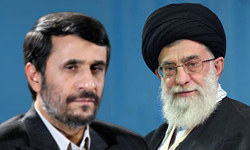
2140 GMT: Bushehr Games. The Israeli Government has denounced the introduction of uranium rods into Iran's first nuclear plant.
Foreign Ministry spokesman Yossi Levy said:
It is totally unacceptable that a country that so blatantly violates resolutions of theSecurity Council, decisions of the International Atomic Energy Agency and its commitments under the NPT (Nuclear Non-Proliferation Treaty) should enjoy the fruits of using nuclear energy. The international community should increase pressure on to force Iran to abide by international decisions and cease its enrichment activities and its construction of reactors.
[Editor's Note: Israel is not a signatory of the Nuclear Non-Proliferation Treaty.]
1850 GMT: Why Can't We Be Friends? Looks like Britain has got an unexpected round of applause from Iran's state media.
Earlier today Foreign Office Minister Alistair Burt
put out the statement, "The loading of Russian fuel into the Bushehr nuclear power reactor demonstrates that Iran can have the benefits of nuclear power. We have always respected Iran's right to develop an exclusively civil nuclear power programme."
Press TV found
a reason to be cheerful: "UK: Iran Entitled to Peaceful N Energy".
However, the Iranian website did not mention the next sentence of Burt's statement: "The problem is Iran's continued refusal to satisfy the IAEA and international community that its work on uranium enrichment and heavy water projects are exclusively peaceful."
NEW Iran Video: BBC Interview with Human Rights Lawyer Mohammad Mostafaei
Iran Document & Analysis: Supreme Leader’s Speech on US-Iran Relations & Internal Situation (18 August)
Iran: Obama Administration Dampens Down War Chatter (Mazzetti/Sanger)
The Latest from Iran (21 August): Khamenei v. Ahmadinejad?
1840 GMT: Tough Talk Today (cont.). Brigadier General Yadollah Javani
waves at the US and Israel, "Should the enemy make this mistake [of attacking Iran], the Islamic Republic is capable of defending itself beyond its borders and of putting the interests of the enemies in jeopardy."
Javani said the test-firing of the new surface-to-surface missile, Qiam 1, "demonstrate[d] Tehran's military might to the enemies".
1505 GMT: Family Matters. Zahra Rahnavard
has strongly condemned the "Family Protection" bill, urging Parliament to reject it, as she claims that it gives more power to men to be polygamous without the knowledge of a wife and harshly discriminates against women. Rahnavard asserted, "Striking the so-called 'Family Protection bill from Parliament's agenda is not a feminist demand but rather is a symbol of national demand for the prosperity of the Iranian nation and the stability of Iranian families."
1425 GMT: Shutting Down Politics. The Ministry of Interior has re-confirmed that the Islamic Iran Participation Front and Mojadehin of Islamic Revolution party
are now illegal.
1420 GMT: The Human Rights Lawyer. We have posted the
video of BBC HARDTalk's interview with lawyer Mohammad Mostafaei, who recently had to leave Iran to avoid arrest.
1320 GMT: Political Prisoner Watch (The Lawsuit Against Nokia Siemens). CNN
has picked up on the story of the lawsuit of detained journalist Isa Saharkhiz and his son Mehdi against Nokia Siemens Networks for sale and provision of technology used by the Iranian Government for surveillance (see 0835 GMT).
1315 GMT: Political Prisoner Watch. Hamed Omidid, a technology student at Allameh University,
has been sentenced to three years in prison for assembly and conspiracy against national security.
Omided was detained on 10 February during a Tehran University protest of the execution of Ehsan Fattahian. He was given the maximum sentence become he was in the front row of demonstrators. He has also been banned from continuing his studies.
1310 GMT: Tough Talk Today. Mahmoud Ahmadinejad,
talking to Qatari daily Al-Sharq, on the response if Iran is attacked:
Our options will have no limits....They will touch the entire planet....I believe that some think about attacking Iran, especially those within the Zionist entity. But they know that Iran is an indestructible bulwark and I do not think their American masters will let them do it. They also know that the Iranian response will be hard and painful.
1130 GMT: Sanctions Watch (US-Turkey Edition). The Turkish daily
Hurriyet follows up the story that a US delegation from the State and Treasury Departments have warned that Turkish companies that continue their relations with Iran in defiance of sanctions risk breaking business ties with the US.
The delegation reportedly stated it will enforce sanctions against Turkish organizations investing in Iran’s energy sector and selling petroleum products to Tehran.
The US Embassy's spokeswoman said, “A group visited this week from the Treasury Department and discussed the new U.S. legislation on the UN’s decision [to impose] sanctions against Iran. There are Turkish companies that want to do business with the United States and they should be aware of the latest law."
1120 GMT: Political Prisoner Watch. Professor Hadi Hakim-Shafaei
has been given a three-year sentence for acting against national security, insulting the Supreme Leader, and carrying out anti-regime propaganda.
Hakim-Shafaei was detained on 11 February and held for 30 days, 15 in solitary confinement, before being released on $50,000 bail. He has also been banned from teaching .
1015 GMT: Nuclear Hype. Amidst a slow news day in Iran,
The Daily Telegraph uses the Bushehr nuclear plant as an excuse for
a blatant distortion of an article.
The
Telegraph lifts the comment from Gary Samore, President Obama's advisor on nuclear proliferation, in The New York Times article that we noted yesterday: "The process of converting nuclear material into a weapon that worked would take at least 12 months."
Setting aside the fact that Bushehr has nothing to do with a possible military programme, the
Telegraph ignores the context of Samore's comment, which was part of an Obama Administration pushback against talk of an Israeli airstrike on Iran. Instead, the headline in the
Telegraph turns Samore's intervention into the pressure for such action: "Iran '12 Months from Nuclear Weapon' US Warns as Bushehr Reactor Started".
0835 GMT: Political Prisoner Watch (The Lawsuit Against Nokia Siemens). Cyrus Farivar, writing for
Deutsche Welle,
follows up on this week's story that detained journalist Isa Saharkhiz and his son Mehdi have filed a lawsuit in US Federal Court against Nokia Siemens Networks, alleging that the Finnish-Germany company sold and provided equipment used by the Iranian Government for surveillance of dissidents:
Testifying before a European Parliament committee on human rights over two months ago, Nokia executive Barry French said his company had sold "roughly one third of the deployed capacity" for mobile and data service to two major Iranian mobile operators, MCI and Irancell.
As part of these networks, Nokia Siemens provided a "lawful interception capability to both operators" and "a related monitoring center to MCI."
But Herischi, the lead attorney for the plaintiffs, alleged that Nokia Siemens either knew or should have known that lawful interception in Iran does not conform to international standards.
"Lawful interception is required for every network," he said. "And that's what we're asking. The one that Iran used was unlawful interception with the same device, and they knew that it was going to be used unlawfully."
Nokia Siemens on Friday expanded on their previous statements concerning the US lawsuit, saying that it was "brought in the wrong place, against the wrong party, and on the wrong premise."
"The Saharkhizes allege brutal treatment by the government in Iran, but they have not sued that government," the company wrote on its Web site. "Instead, they are seeking to blame Nokia Siemens Networks for the acts of the Iranian authorities by filing a lawsuit in the US, a country that has
absolutely no connection to the issues they are raising."
0750 GMT: Over-the-Top Headline of the Day. I guess, since everyone from New York to Jerusalem is leading with the Bushehr nuclear plant story, you have to dare to be different, but
the BBC may have un-distinguished itself: "Will Fuelling The Bushehr Reactor Give Iran The Bomb?"
(The answer is No.)
0715 GMT: No doubt what the lead story will be in Iranian state media and "Western" press today, from
Press TV to
Reuters to
The New York Times to
The Jerusalem Post.
After years of delays, the first uranium rods will be loaded into Iran's first nuclear plant at Bushehr. State television is showing live pictures of the head of Iran's Atomic Energy Organization, Ali Akbar Salehi, and his Russian counterpart watching the process.
We're going to buck the trend. For EA, the curious tale is why President Ahmadinejad apparently contradicted the Supreme Leader over Iran's position on talks with the US on uranium enrichment. On Thursday, Ahamadinejad told a Japanese newspaper that discussions could begin within weeks; less than 24 hours earlier, Ayatollah Khamenei had ruled out any negotiations unless the US pulled back on sanctions against Tehran.
There's an important context, indeed precedent, for the story. Last autumn, it was Ahmadinejad who was pushing for a deal with the US and other countries, all the way to the Geneva talks in October. One of the reasons why those discussions, the first direct public contact with Washington in years, stalled was because of the opposition of not only the Supreme Leader but also key political figures such as Speaker of Parliament Ali Larijani.
So, given the growing tensions within the Iranian political elite --- tensions highlighted by both the Supreme Leader and the leader of Tehran Friday Prayers this week --- are the nuclear talks again intersecting with power plays in Tehran?
 Sunday, August 22, 2010 at 8:36
Sunday, August 22, 2010 at 8:36  Cracks are appearing this morning in the narrative of warm acceptance, at least on the Palestinian side, of the US formal invitation for direct Israel-Palestine talks on 2 September.
Cracks are appearing this morning in the narrative of warm acceptance, at least on the Palestinian side, of the US formal invitation for direct Israel-Palestine talks on 2 September.




